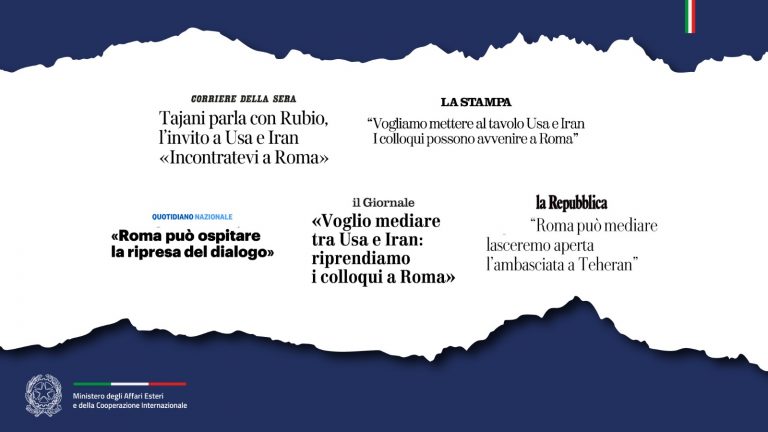Minister Tajani: “We support Israel’s defence but civilians must be protected” (Corriere della Sera)
From the G7 Foreign Ministers’ Meeting in Tokyo, to Paris for the Gaza emergency, with one objective: “To tackle the humanitarian crisis suffered by the civilian population while also trying to manage the political clash, in order to plan for an ‘after’”. Antonio Tajani measured his words: “Great balance is needed”.
What is expected from the Paris conference?
“The French government has quickly organised this decisive conference, dedicated first and foremost to tackling the humanitarian crisis suffered by the civilian population, but also to try to manage the political clash, to start thinking about the ‘after’, about the time when Gaza will need to be rebuilt, both from a material and a political point of view”.
What is Italy’s position?
“Italy comes with a great sense of responsibility, with balance, with total commitment. We are not sleepwalkers, we do not want to plunge deeper into the war”.
Is this line shared by other European countries?
“We talked with our international allies, the US, Canada and Japan. We discussed with an incredible sense of responsibility and realism. We Europeans, united. Our message is clear: we condemn the terrorist attack of 7 October, we support Israel’s full right to defend itself, but we ask everyone and therefore also Israel to protect civilians, to allow humanitarian pauses in the fighting in order to assist the people of Gaza. We also urge Israel to stop the violence of extremist settlers in the Palestinian territories of the West Bank”.
Is Italy in favour of a ceasefire?
“We want this war to end as soon as possible. But we also want Israel to remove the Hamas terrorist groups. If Israel is to continue its military operations, it must do so while respecting international law, protecting the civilian population and organising ceasefires so that hostages can be released and Gaza citizens protected. We hope to be able to interpret the aspirations, the positions, even the anxieties of these two peoples. That is why, however impossible it may seem today, we want to work on the ‘two peoples two states’ formula. We have no alternative”.
Do you fear outbreaks of anti-Semitism in Italy?
“It is a curse that Italy and Europe have not yet rid themselves of. The Italian Government has reinforced all the measures aimed at protecting our Jewish compatriots and in the final document of the G7 we mentioned both the risk of renewed anti-Semitism and that of Islamophobia”.
Is there a risk of radicalisation among those who live here?
“I believe that cases of individual radicalisation are most likely. To respond to wider extremist movements, we must resort to careful and close surveillance, but also to dialogue, to the inclusion of all the souls within Italian society. Nevertheless, Italy has always fought terrorism and will always do so while respecting the law and keeping a cool head”.
Meanwhile there is controversy over the agreement with Albania on the migrant front: did the premier decide on her own?
“I have read stories and articles in Italian newspapers that are completely absurd, factually untrue. The agreement was made by the entire Italian Government. The Italian Presidency of the Council, the Ministry of Foreign Affairs, the Interior, Justice and Health worked on it together. The entire negotiation process, from its initial stages, was managed, as usual, by my Ministry. The first preparatory meeting was held in my office in Palazzo Chigi. After an initial meeting with Giorgia Meloni, I called a preliminary operational meeting on 6 April between the Ministry of Foreign Affairs, the Ministry of the Interior and the Embassy in Tirana. This agreement was not born over a glass of wine on holiday. The first operational mission in Tirana involving the Ministry of Foreign Affairs and the Interior started on 24 May. We have dozens of minutes, emails, reports of meetings between our officials and with Albanian leaders”.
The agreement has received a lot of criticism. There are those who claim it violates the standards for reception.
“We have worked with the Ministry of Justice to examine every legal aspect. We have examined similar cases, read the judgments and international and European case law. Whoever says we are heading towards Guantanamo is making both an offensive and ridiculous statement. It is an initiative to combat human trafficking with the cooperation of an EU candidate country. Albania agrees with us that the immigration issue can be solved together. This is a practical example of European solidarity”.


